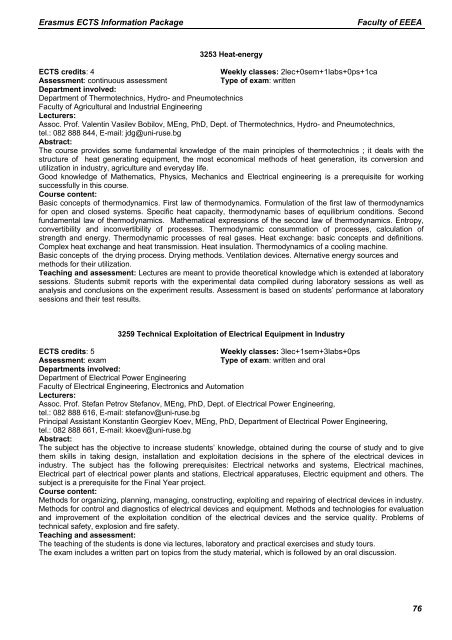Erasmus ECTS Information Package
Erasmus ECTS Information Package
Erasmus ECTS Information Package
You also want an ePaper? Increase the reach of your titles
YUMPU automatically turns print PDFs into web optimized ePapers that Google loves.
<strong>Erasmus</strong> <strong>ECTS</strong> <strong>Information</strong> <strong>Package</strong><br />
Faculty of EEEA<br />
3253 Heat-energy<br />
<strong>ECTS</strong> credits: 4<br />
Weekly classes: 2lec+0sem+1labs+0ps+1ca<br />
Assessment: continuous assessment<br />
Type of exam: written<br />
Department involved:<br />
Department of Thermotechnics, Hydro- and Pneumotechnics<br />
Faculty of Agricultural and Industrial Engineering<br />
Lecturers:<br />
Assoc. Prof. Valentin Vasilev Bobilov, MEng, PhD, Dept. of Thermotechnics, Hydro- and Pneumotechnics,<br />
tel.: 082 888 844, E-mail: jdg@uni-ruse.bg<br />
Abstract:<br />
The course provides some fundamental knowledge of the main principles of thermotechnics ; it deals with the<br />
structure of heat generating equipment, the most economical methods of heat generation, its conversion and<br />
utilization in industry, agriculture and everyday life.<br />
Good knowledge of Mathematics, Physics, Mechanics and Electrical engineering is a prerequisite for working<br />
successfully in this course.<br />
Course content:<br />
Basic concepts of thermodynamics. First law of thermodynamics. Formulation of the first law of thermodynamics<br />
for open and closed systems. Specific heat capacity, thermodynamic bases of equilibrium conditions. Second<br />
fundamental law of thermodynamics. Mathematical expressions of the second law of thermodynamics. Entropy,<br />
convertibility and inconvertibility of processes. Thermodynamic consummation of processes, calculation of<br />
strength and energy. Thermodynamic processes of real gases. Heat exchange: basic concepts and definitions.<br />
Complex heat exchange and heat transmission. Heat insulation. Thermodynamics of a cooling machine.<br />
Basic concepts of the drying process. Drying methods. Ventilation devices. Alternative energy sources and<br />
methods for their utilization.<br />
Teaching and assessment: Lectures are meant to provide theoretical knowledge which is extended at laboratory<br />
sessions. Students submit reports with the experimental data compiled during laboratory sessions as well as<br />
analysis and conclusions on the experiment results. Assessment is based on students’ performance at laboratory<br />
sessions and their test results.<br />
3259 Technical Exploitation of Electrical Equipment in Industry<br />
<strong>ECTS</strong> credits: 5<br />
Weekly classes: 3lec+1sem+3labs+0ps<br />
Assessment: exam<br />
Type of exam: written and oral<br />
Departments involved:<br />
Department of Electrical Power Engineering<br />
Faculty of Electrical Engineering, Electronics and Automation<br />
Lecturers:<br />
Assoc. Prof. Stefan Petrov Stefanov, MEng, PhD, Dept. of Electrical Power Engineering,<br />
tel.: 082 888 616, E-mail: stefanov@uni-ruse.bg<br />
Principal Assistant Konstantin Georgiev Koev, MEng, PhD, Department of Electrical Power Engineering,<br />
tel.: 082 888 661, E-mail: kkoev@uni-ruse.bg<br />
Abstract:<br />
The subject has the objective to increase students’ knowledge, obtained during the course of study and to give<br />
them skills in taking design, installation and exploitation decisions in the sphere of the electrical devices in<br />
industry. The subject has the following prerequisites: Electrical networks and systems, Electrical machines,<br />
Electrical part of electrical power plants and stations, Electrical apparatuses, Electric equipment and others. The<br />
subject is a prerequisite for the Final Year project.<br />
Course content:<br />
Methods for organizing, planning, managing, constructing, exploiting and repairing of electrical devices in industry.<br />
Methods for control and diagnostics of electrical devices and equipment. Methods and technologies for evaluation<br />
and improvement of the exploitation condition of the electrical devices and the service quality. Problems of<br />
technical safety, explosion and fire safety.<br />
Teaching and assessment:<br />
The teaching of the students is done via lectures, laboratory and practical exercises and study tours.<br />
The exam includes a written part on topics from the study material, which is followed by an oral discussion.<br />
76
















